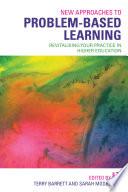
New Approaches to Problem-based Learning
Revitalising Your Practice in Higher Education
Problem-based learning (PBL) is a pedagogical approach that has the capacity to create vibrant and active learning environments in higher education. However, both experienced PBL practitioners and those new to PBL often find themselves looking for guidance on how to engage and energise a PBL curriculum. New Approaches to Problem-based Learning: Revitalising your Practice in Higher Education provides that guidance from a range of different, complementary perspectives. Leading practitioners in the field as well as new voices in PBL teaching and learning have collaborated to produce this text. Each chapter provides practical and experienced accounts of issues and ideas for PBL, as well as a strong theoretical and evidence base. Whether you are an experienced PBL practitioner, or new to the processes and principles of PBL, this book will help you to find ways of revitalising and enriching your practice and of enhancing the learning experience in a range of higher education contexts.
- ISBN 13 : 1136937684
- ISBN 10 : 9781136937682
- Judul : New Approaches to Problem-based Learning
- Sub Judul : Revitalising Your Practice in Higher Education
- Pengarang : Terry Barrett, Sarah Moore,
- Kategori : Education
- Penerbit : Routledge
- Bahasa : en
- Tahun : 2010
- Halaman : 314
- Halaman : 314
- Google Book : https://play.google.com/store/books/details?id=d6zHBQAAQBAJ&source=gbs_api
-
Ketersediaan :
At the end of each tutorial/learning session or on a regular basis (once a week or
fortnight) it is useful to ask a few questions of the students. The students can write
short responses and either leave them on a table as they leave the session or
share them in the group. To prevent overload, it is best to focus on only one or
two questions that can be recycled periodically from a base of six to eight
questions, for example: What was the most useful learning point from the tutorial/
session?
